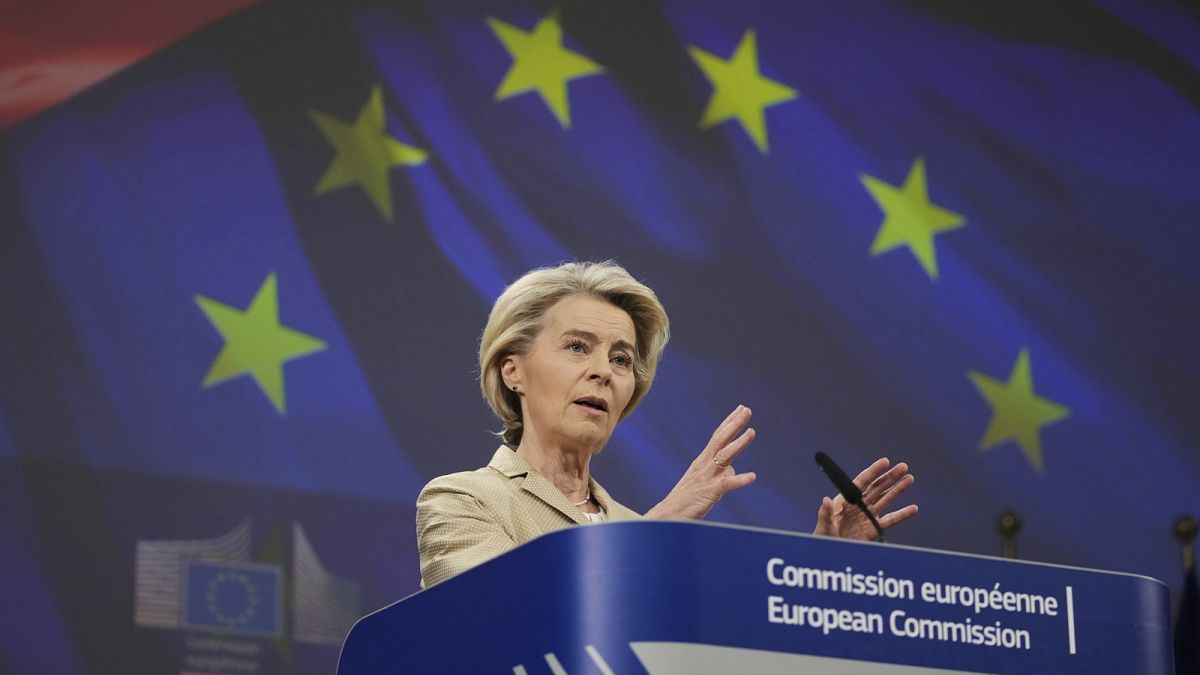The European Union is preparing to tighten the screws on Russia and compel Vladimir Putin into a 30-day unconditional ceasefire in Ukraine through a fresh round of sanctions that will target the energy and financial sectors, Ursula von der Leyen has said.
The president of the European Commission pointed to Putin’s refusal to meet with Volodymyr Zelenskyy in Turkey and personally engage in negotiations as a reason to move forward with hard-hitting restrictions on the Russian economy.
“President Zelenskyy was ready to meet. President Putin never showed up. And this shows the true belief of President Putin: he does not want peace,” von der Leyen said on Friday morning as she arrived at a summit of European leaders in Albania.
“For us, it’s important: we want peace. And therefore, we have to increase the pressure on President Putin till he is ready for peace.”
According to von der Leyen, the next package of EU sanctions will go after Moscow’s banks, many of which are already under comprehensive bans, and Nord Stream I and II, the gas pipelines that connect Russia to Europe and are currently non-operational.
A Commission spokesperson said sanctions on Nord Stream would help to “dissuade any interest from investors in pursuing any activity” in the controversial project.
Brussels will also seek to lower the price cap on Russian crude oil that the G7 and Australia imposed at the end of December 2022.
The cap prohibits Western companies from providing services to Russian tankers, such as insurance, financing and flagging, that sell crude oil above a price of $60 per barrel. The cap has remained untouched since its approval, despite strong fluctuations in Russia’s worldwide trade and ample evidence of circumvention.
Earlier this year, the Nordic and Baltic member states pushed for a review of the initiative to lower the price tag and squeeze the Kremlin’s energy profits.
Von der Leyen did not specify at which level the cap should be set.
Given the G7 dimension, the change will require the blessing of the White House, which has so far refrained from imposing any fresh sanctions against the Kremlin, despite Putin’s continued refusal to abide by the terms laid out by Donald Trump.
A spokesperson noted the Commission would “reach out” to Washington to ensure “coordinated action” at the international level.
Brussels rings Washington
As a way to bypass the G7 price cap, Moscow has deployed a “shadow fleet” of aged, poorly-kept tankers that use obscure ownership and insurance structures.
The fleet has been accused of deceptive practices, including transmitting falsified data, turning off their transponders to become invisible and conducting multiple ship-to-ship transfers to conceal the origin of their barrels. The vessels are also under intense scrutiny for engaging in sabotage against Europe’s critical infrastructure.
The EU has so far blacklisted over 350 vessels belonging to the “shadow fleet” and is willing to expand the catalogue in the coming weeks.
“These sanctions are biting. Russia’s oil and gas revenues have fallen by almost 80% compared to before the war. Russia’s deficit is skyrocketing. Interest rates are prohibitively high. Inflation is on the rise, well above 10%,” von der Leyen said in Tirana.
“We are ready to do more to bring President Putin to the negotiation table.”
The Commission president’s comments come two days after EU ambassadors endorsed the 17th package of sanctions, which was limited in scope and lacked any biting constraints on Russia’s economic sectors. The package had been in the works for over a month and is unrelated to recent diplomatic events.
The “Coalition of the Willing” initially established a Monday deadline for Russia to accept a temporary ceasefire in Ukraine, but the day came and went without immediate repercussions. There has not been any indication of a new deadline since then.
Meanwhile, in Washington, Senator Lindsey Graham, a pro-Ukraine Republican, is gathering bipartisan signatures for a new plan to impose 500% tariffs on goods from any country that buys oil, gas and uranium from Russia. If implemented, the measure could hit hard some European nations that are still reliant on Moscow.
In Brussels, the possibility of hiking up tariffs on Russian exports is gaining traction, as trade policy requires a qualified majority, rather than unanimity, to be approved, which means individual vetoes from countries like Hungary and Slovakia would not apply.
Read the full article here


